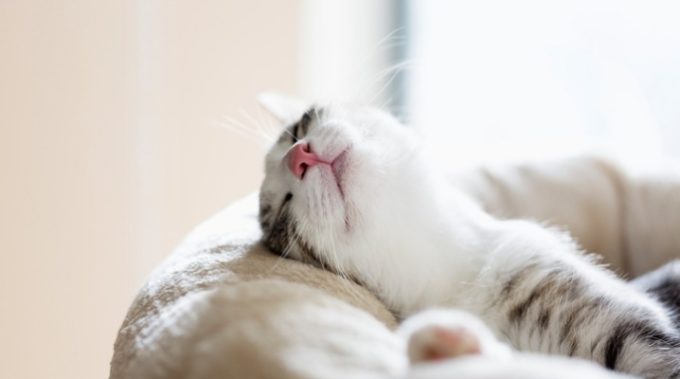
It’s a fact that cat owners know well: our feline friends sleep, and they sleep a lot. If you don’t see your cat playing or grooming itself during the day, there’s a good chance it’s off somewhere cozy, sleeping. In fact, cats spend nearly two-thirds of their lives asleep!
Many first-time pet owners get concerned when their cats aren’t up and running around during the day. However, there is very little cause for concern here. A normal day for a cat consists of between 16 to 18 hours of sleep, and even more depending on their age. Kittens and older cats sleep more than the average cat, sometimes even close to 24 hours a day!
The Truth Behind the Slumber
Why do cats spend so much of their blissful existence lounging around, particularly if they are domestic and don’t do much besides sleep? As it turns out, cats are just hard-wired this way!
In the wild, cats chase their prey long and hard in order to eat and stay healthy. All this activity can really tire them out quickly, meaning they need a lot of sleep to recover. This is the way it’s been for centuries, meaning it’s not only wild cats that have these sleeping traits. Domestic cats are also genetically programmed to be class-A sleepers.
A Few Snoozing Facts
There’s also more than what meets the eye when it comes to cats and their sleep schedules. Here are a few interesting facts about your kitty’s slumber.
They dream: Like humans, cats experience both REM and non-REM sleep within their 16 to 20 hours of slumber. Typically, cats stay in a light doze, but they will have a few minutes of deep REM sleep every so often and will even dream! If your cat’s face or body is twitching while it sleeps, it is probably dreaming.
They are super-alert: Cats experience super-high brain activity while they sleep, helping them get up and alert at a moment’s notice if disturbed. While humans often need time to wake up from a peaceful slumber, it doesn’t take cats long to become alert. This is because of their evolutionary biology, which allows them to stay safe in the wild and hunt prey. If your cat hears a loud noise while sleeping, it will likely be on its feet and ready to run in seconds.
They like the night: Cats are crepuscular, meaning they are most active between dusk and dawn. If you don’t see them much during the day, that doesn’t necessarily mean they are sleeping 24/7. They are probably wide awake at night, playing and investigating the house while you’re asleep. However, cats do spread out their bursts of sleep and will probably snooze a bit at night, too.
Should You Ever Worry?
Yes, a cat sleeping a lot during the day is perfectly normal. However, there are some instances where too much sleep is possible, and it’s usually a bad thing. In order to keep your cat healthy, try monitoring how much it sleeps as opposed to how much it plays or is active in your home. This way, you’ll be able to tell if there is an underlying health issue.
One of the most common problems confused with sleep in cats is lethargy, which is when your cat lays around and doesn’t want to move or play at all. If your cat is lethargic, it might be suffering from a variety of ailments, some worse than others. It may simply be overweight—a common cause of lethargy—or might be suffering from arthritis, diabetes, heartworm or even cancer.
To help your cat, be cautious of its symptoms and take it to the vet to have it examined and treated if there is something wrong. On the other hand, cats not sleeping enough is also a problem. Cats that experience restlessness or insomnia may also be suffering from health problems, or they may be stressed and anxious. Restlessness at night may be accompanied by meowing or crying, in which case you should take your cat to the vet.
If you notice your cat exhibiting signs of anxiety or stress, including pacing, incessant meowing or aggression, you may want to take it to the vet. You can also try supplements to help it manage stress, as well as identifying the source and fixing it.
Let Your Cat Snooze!
In sum, there’s likely no need to worry if your feline companion is spending most of its day sleeping. It’s just part of its normal behavior. If you notice abnormal behavior such as excess lethargy or restlessness, identify its symptoms and take it to the vet to make sure nothing else is wrong. Otherwise, just let your lovable cat sleep!
Compliments of Pets Wellbeing Newsletter. Veterinarian Reviewed by Dr. Janice Huntingford, DVM on June 14, 2018.
Dr. Janice Huntingford, DVM, has been in veterinary practice for over 30 years and has founded two veterinary clinics since receiving her Doctor of Veterinary Medicine at the Ontario Veterinary College, University of Guelph. She has studied extensively in both conventional and holistic modalities.
